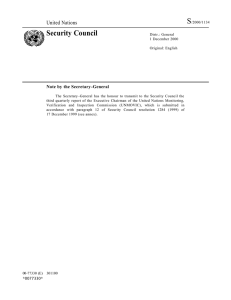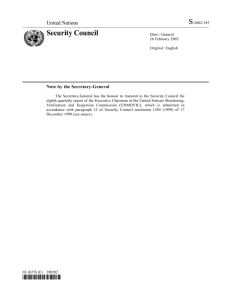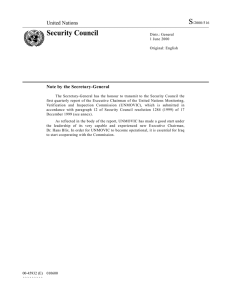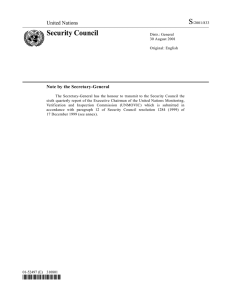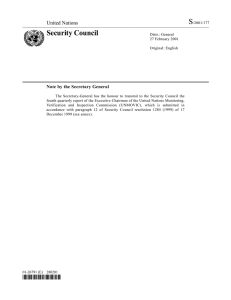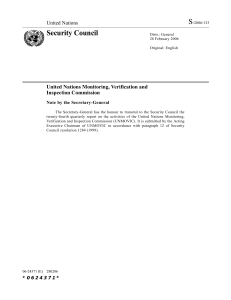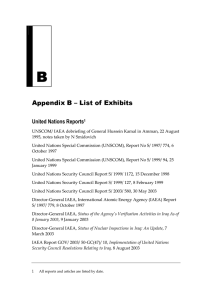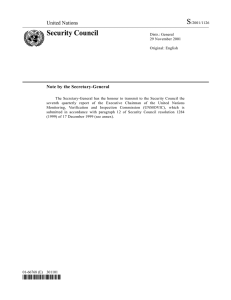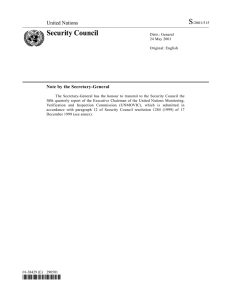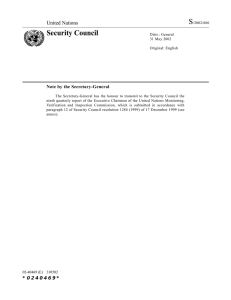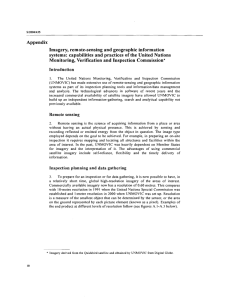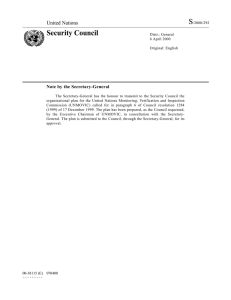S Security Council United Nations Note by the Secretary-General
advertisement
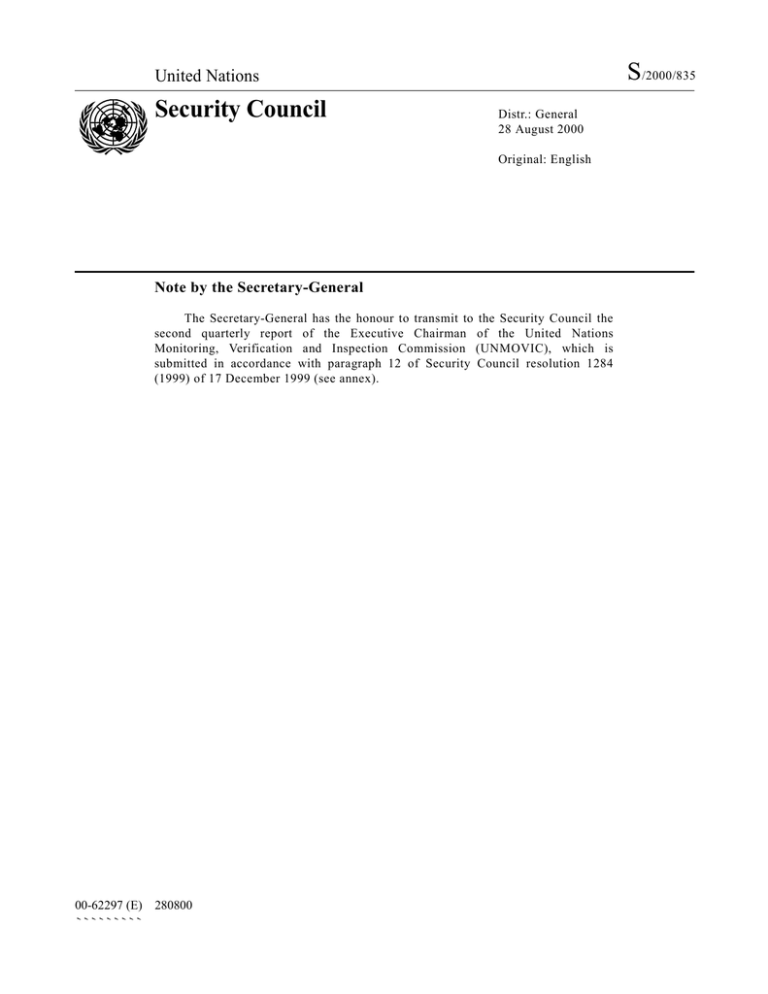
S/2000/835 United Nations Security Council Distr.: General 28 August 2000 Original: English Note by the Secretary-General The Secretary-General has the honour to transmit to the Security Council the second quarterly report of the Executive Chairman of the United Nations Monitoring, Verification and Inspection Commission (UNMOVIC), which is submitted in accordance with paragraph 12 of Security Council resolution 1284 (1999) of 17 December 1999 (see annex). 00-62297 (E) 280800 ````````` S/2000/835 Annex Second quarterly reporta of the Executive Chairman of the United Nations Monitoring, Verification and Inspection Commission under paragraph 12 of Security Council resolution 1284 (1999) Introduction 1. The present report, which is submitted in accordance with paragraph 12 of Security Council resolution 1284 (1999), covers the activities of the United Nations Monitoring, Inspection and Verification Commission (UNMOVIC) in the period from 1 June to 31 August 2000. College of Commissioners 2. The second meeting of the College of Commissioners took place on 23 and 24 August 2000. In addition to the members of the College, observers from the International Atomic Energy Agency (IAEA) and the Organization for the Prohibition of Chemical Weapons (OPCW) attended. The Chairman opened the second meeting and, in the course of his introductory remarks, he reported on the results of the first UNMOVIC training course and on recruitment. He introduced discussion papers on operating procedures under a reinforced system of ongoing monitoring and verification and on a draft action plan for the resumption of activities in Iraq. 3. In response to a request that had been made at the first session of the College, the Commissioners also had before them an informal paper on the experience of the United Nations Special Commission (UNSCOM) in respect of the modalities for the inspection of “sensitive sites”. Papers were circulated and introduced by one Commissioner on the issue of sampling and by another on the use of satellite imagery. 4. The Commissioners had an exchange of views regarding procedures applied, and to be applied, for operations in the field, including, in particular, for “sensitive sites”. Inter alia, the need for guidelines and standard operating procedures that would especially assist Chief Inspectors in the conduct of their responsibilities was stressed. It was agreed that the secretariat of UNMOVIC would continue consideration of operating procedures which would be reverted to at the next meeting of the College. The Commissioners discussed a draft action plan for the resumption of activities in Iraq. They also discussed sampling procedures and agreed that a further paper on this subject would be prepared by the secretariat, taking account of the observations made by the Commissioners. After discussion, the Chairman indicated that the paper on imagery would be further studied by the UNMOVIC secretariat. 5. In accordance with paragraph 5 of resolution 1284 (1999), the College of Commissioners was consulted on the contents of the present report. The College set 27 to 29 November 2000 as the dates for its next meeting. 2 S/2000/835 Recruitment 6. One of the main activities of the Commission has been the further recruitment of staff for UNMOVIC. Individuals have been selected for all of the senior positions of the Commission in New York. The complement of headquarters-based core staff of the various divisions and the Administrative Service is almost filled. As of 31 August, the total number of people holding positions as Professional staff of the Commission is 42. In keeping with the aim of broad geographic representation, the number of nationalities is 20. Interviews also continued to identify staff who will be recruited for headquarters or put on the roster for use in the field when operations start again. Such individuals will also attend the second UNMOVIC training course. 7. In further recruitment, the Executive Chairman will continue to be guided by the terms of Security Council resolution 1284 (1999) and the organizational plan (S/2000/292 and Corr.1) approved by the Council on 13 April 2000 (see S/2000/311). Training 8. In resolution 1284 (1999), the Security Council requested the Executive Chairman to arrange for the provision of high-quality technical and cultural training for UNMOVIC personnel. The first UNMOVIC training programme was held from 11 July to 10 August. Forty-four persons, encompassing some 19 nationalities, took part. Trainees were given general lectures on the past work of UNSCOM, the origins of UNMOVIC, its mandate, including the legal framework of the Council’s resolutions and decisions, the Commission’s rights and Iraq’s obligations. The trainees had courses covering the scope of Iraq’s proscribed weapons programmes, dual-use technologies and discipline specific training (chemical, biological, ballistic missile and export/import) including monitoring and inspection techniques. The course also covered operational health and safety issues. In accordance with paragraph 6 of resolution 1284 (1999), trainees were also provided with cultural training, including the history, economy, politics and society of Iraq. Cultural training also covered regional, social and religious themes. Those lectures were provided by Columbia University academics. The Commission stands in gratitude to all of the lecturers who gave their time without fee, and also to the Government of the United States of America which provided facilities and personnel for health and safety training as well as site visits, likewise free of charge. Preparations are under way for the second training course, which is planned to be held in France from 7 November to 8 December. 9. With the completion of the first UNMOVIC training course and the recruitment of a sufficient number of professional and trained core staff and the number of trained professionals on the roster, the Commission could plan and commence a number of activities in Iraq which would be necessary to prepare for monitoring, verification and inspection envisaged by the Security Council. Premises 10. The Executive Chairman has continued his contacts with the Permanent Representative of Bahrain to the United Nations concerning the establishment of a 3 S/2000/835 field office there for the use of UNMOVIC and the International Atomic Energy Agency (IAEA). Negotiations are being actively pursued, involving UNMOVIC, IAEA and the United Nations Office of Legal Affairs, to arrive at a mutually acceptable text of a field office agreement. 11. At UNMOVIC headquarters in New York, the limited office space available to a growing staff remains a severe problem and, if continued, will adversely affect the working environment and proper implementation of the tasks of the Commission. The Administrative Service continues to seek office space near the headquarters building to alleviate overcrowding in the premises of the Commission. Ongoing activities 12. The Commission’s staff have begun a systematic and thorough review of the Commission’s databases with a view to creating a single, secure, central system, which would also be capable of being accessed from the Commission’s premises in Baghdad. In addition, Commission staff have been reassessing and evaluating the archives taken over from UNSCOM. Staff have started examining inspection procedures with a view to defining appropriate operational procedures to be applied under the reinforced system of ongoing monitoring and verification. UNMOVIC staff are examining the procedures followed by UNSCOM to determine their applicability for the future. Inspection plans for the reestablishment of the baseline are being prepared. Staff are also looking at the formats for Iraq’s monitoring declarations to see if they should be revised. 13. Pursuant to Security Council resolution 1051 (1996) of 27 March 1996, the Export/Import Joint Unit continues to receive notifications from States and international organizations of exports to Iraq of dual-use goods subject to the provisions of that resolution. The Government of Iraq has not provided UNMOVIC with any notifications or other mandated declarations during the period under review. Notes a 4 The Commission’s first quarterly report was issued as document S/2000/516 of 1 June 2000.
